What Happens To Your Body When You Eat Pumpkin
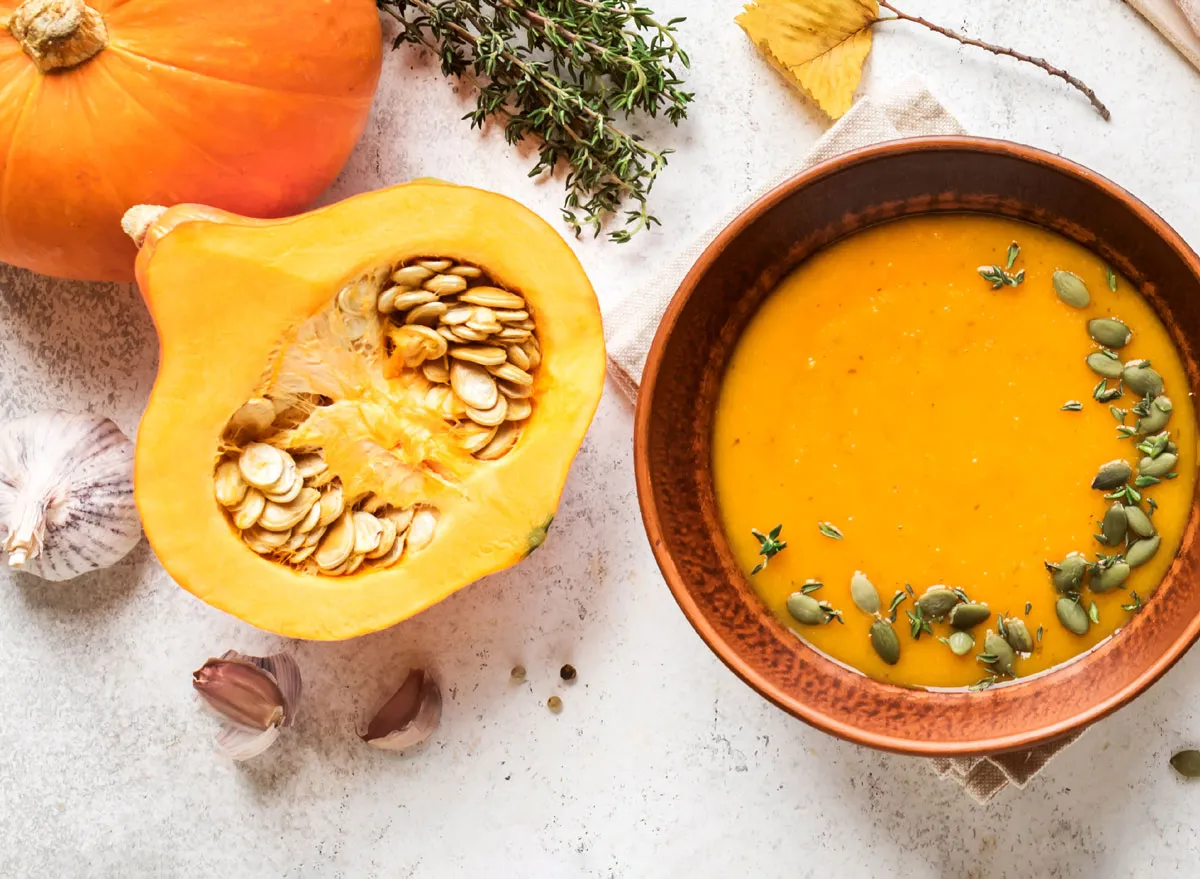
Fall is here, which means many of us have been enjoying pumpkin spice-flavored foods and drinks for nearly a month now. Whether it’s in the form of a PSL (a pumpkin spice latte for the uninitiated), granola, soup, pie, or ice cream, enjoying the comforting flavor of pumpkin is perfect for the autumn months. And while many of these pumpkin-inspired foods lack in much of the actual vegetable itself, pumpkin at its core has many amazing health benefits.
Before we get into the benefits, let’s look at the common ways to consume pumpkin. Many people may just be used to the giant pumpkins they buy for carving and leaving on their front porch, but there are numerous varieties of this vegetable, with the most common (and easiest) to eat and cook with being the sugar pumpkin—the small, round variety found in many produce sections around this time of year. If you’re not in the mood for the effort it takes to dice and cook it this way, you can also buy canned pumpkin, a very common method for those who need it pureed in pies, smoothies, or coffee drinks at home. These two different forms have similar nutrition facts for the most part, with some slight differences.
Nutrition information for 1 cup of canned, pureed pumpkin
- Calories: 83
- Fat: 0.7 grams
- Protein: 2.7 grams
- Carbohydrates: 19.8
- Fiber: 7
- Sugar: 8
Nutrition information for 1 cup of cubed, raw pumpkin
- Calories: 126
- Fat: 0 grams
- Protein: 1 gram
- Carbohydrates: 7.5 grams
- Fiber: 0.5 grams
- Sugar: 3 grams
The nutritional makeup of pumpkin, including its high levels of vitamins, minerals, and antioxidants, makes this vegetable a healthy choice for your favorite fall recipes. Read on to learn about some of the incredible benefits of eating pumpkin, and for more healthy eating tips, check out 10 Superfood Snacks to Stay Full & Energized All Day Long.
You’ll get a fiber boost.
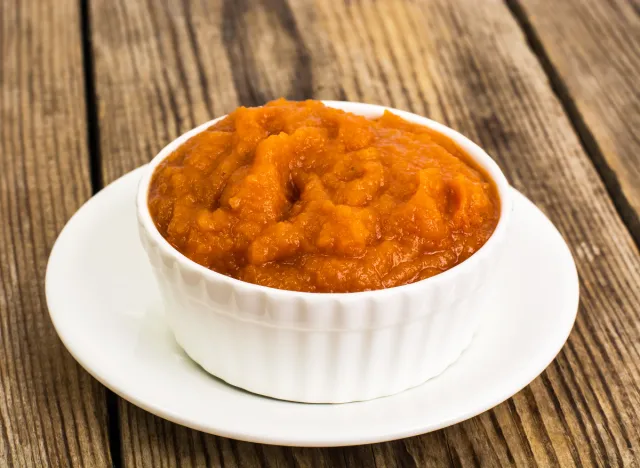
“Pumpkin provides fiber, and it’s a great way to meet your daily fiber recommendation, which is about 28 grams on a 2,000-calorie eating plan,” says Elizabeth Ward, MS, RDN, co-author of The Menopause Diet Plan, A Natural Guide to Hormones, Health, and Happiness.
Both cooked and canned pumpkin contain fiber, with about seven grams per cup of canned and two grams per cup of cooked whole pumpkin. Because of its fiber content, “Adding pumpkin to your diet can help with regularity and gut health,” says Maggie Michalczyk, RDN of Once Upon a Pumpkin. “Fiber is also beneficial for removing cholesterol from the body, as well as blood sugar balance and keeping us fuller for longer.”
One of the types of fiber found in pumpkin is called prebiotic fiber, “which helps nourish the good bacteria in your gut that support optimal digestion and gut function,” says Michalczyk. According to a report published in Current Developments in Nutrition, along with gut health, prebiotic fibers (like those found in pumpkin) can also aid in calcium absorption, reduction of allergy risk, and improved immunity.
You may help your skin health.
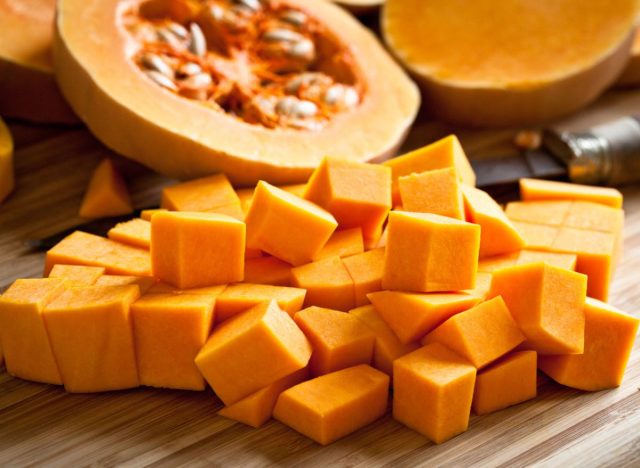
The fall season means plenty of opportunities to eat your favorite fall foods, but it also means chilly temperatures and potentially dryer skin. What if we told you eating a fall food classic (pumpkin) could help both your taste buds and your skin?
“Pumpkin contains a trifecta of skin-supporting vitamins —vitamin A, vitamin C, and vitamin E,” says Michalczyk. In one cup of canned pumpkin, you’ll get about 10 micrograms of vitamin C (the daily value is between 75 and 90 micrograms), approximately 1,900 micrograms of vitamin A (the DV is between 700-900 micrograms), and 2.5 micrograms of vitamin E (the DV is 15 micrograms).
According to Michalczyk, “Beta-carotene gets converted into vitamin A in the body and helps protect skin cells from damage from harmful UV rays, vitamin C is needed for collagen production and skin hydration, and vitamin E is a powerful antioxidant that helps protect against free radical damage.”
Pumpkin can also help your eye health.
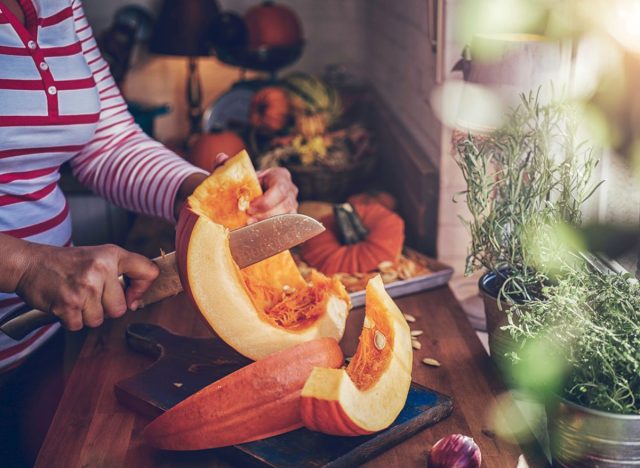
Speaking of vitamins, pumpkin is full of helpful vitamins, minerals, and powerful antioxidants, so consuming this vegetable in whole, frozen, or canned form can be a kind move for your body and health. For instance, pumpkin contains a specific antioxidant called beta-carotene, which is a compound that gives it its rich orange color, as well as provides benefits to the health of your eyes.
“Beta-carotene is a powerful plant pigment that gets converted into vitamin A in the body, and vitamin A plays a crucial role in maintaining eye health,” says Michalcyzk. Beta-carotene isn’t the only antioxidant found in pumpkin that is helpful for your eyes. “Pumpkin is also one of the best sources of lutein and zeaxanthin, two compounds linked to lower risks of age-related macular degeneration and cataracts,” adds Michalcyzk.
It can help boost your immunity.
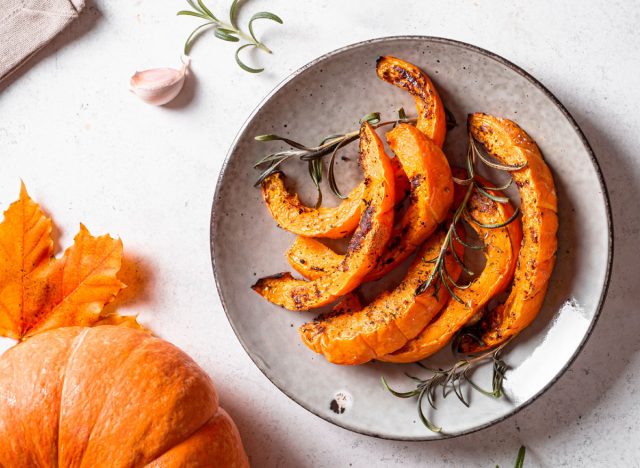
Because of pumpkin’s high levels of vitamins A and C, it is also a vegetable known for helping add strength to your immune system. “Pumpkin is high in antioxidants and packed with vitamins A and C, all of which help strengthen our immune system in different ways,” says Michalcyzk. “Another reason to include it in our diets in the colder months.”
A 2022 report published in Applied Food Research, which looked at the possible functional foods effective in improving immunity strength in the time of COVID-19, suggests that because of the vitamins, minerals, and compounds found in pumpkin, it should be incorporated into more daily diets for better immunity.
Pumpkin provides potassium.

We now know that we can get vitamins A, C, and E, as well as powerful antioxidants and a boost of fiber from eating pumpkin, but on top of all of this, you can also get a hefty dose of potassium as well. In a one-cup serving of pumpkin, you’ll get approximately 500 micrograms of potassium. With the daily value being 4,700 micrograms, this certainly won’t cover it all but will be a great start to getting your needs met.
Getting enough potassium is crucial for several reasons. “Pumpkin is also a source of potassium, which your body needs to support healthy blood pressure, a normal heartbeat, and muscle function,” says Ward. Michalcyzk adds “Potassium is needed for healthy muscle contraction.” The National Institutes of Health also states that a potassium deficiency can lead to things like an increased risk of kidney stones and bone turnover (or the breakdown of bone tissue).
It may benefit the health of your heart.
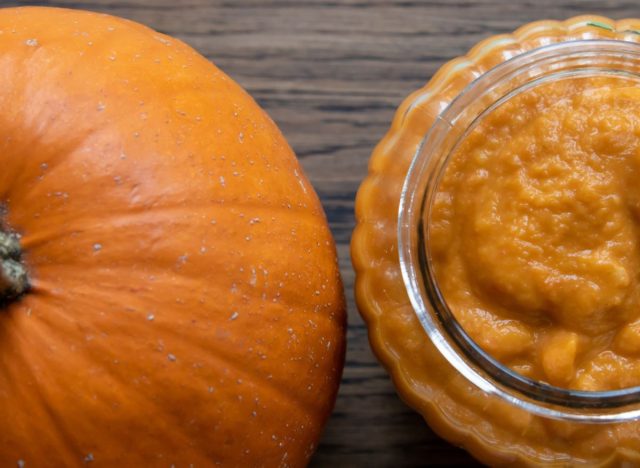
When you look at the combination of vitamins and antioxidants found in pumpkin, you’ll find that these characteristics blend to form the perfect concoction for the health of your heart. “Pumpkin’s potassium, vitamin C, fiber, and high antioxidant content all have heart-protective benefits,” says Michalcyzk.
According to the International Journal of Cardiology, potassium is needed for lowering and managing blood pressure levels, which directly impacts your heart health because too much pressure on the arteries can prevent blood flow to your heart. The journal Nutrients also states that dietary fiber is crucial in lowering cholesterol levels and managing your risk for cardiovascular disease. So, help your heart by adding more pumpkin to your diet this fall.
Pumpkin seeds also carry nutritional value
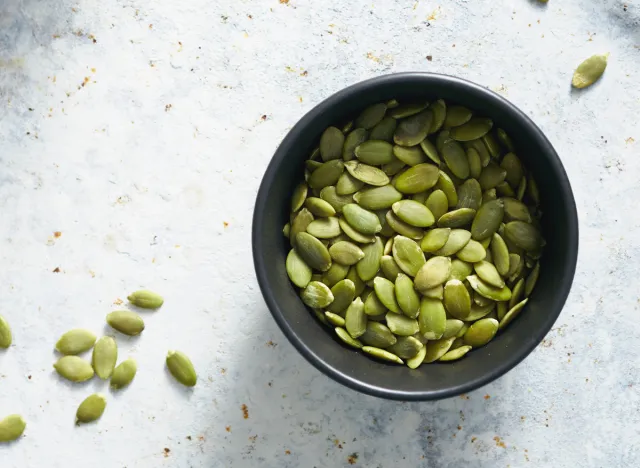
Lastly, if you’re a fan of pumpkin seeds—also called pepitas—you can glean plenty of health benefits from snacking on these as well! “Pumpkin seeds are small but mighty when it comes to nutrition,” says Michalcyzk. “They contain plant-based protein, fiber, and healthy fats, and are also a good source of zinc, which is good for skin and immune health.”
- Source: https://www.fda.gov/food/nutrition-facts-label/daily-value-nutrition-and-supplement-facts-labels
- Source: https://www.ncbi.nlm.nih.gov/pmc/articles/PMC6041804/
- Source: https://fdc.nal.usda.gov/fdc-app.html#/food-details/168450/nutrients
- Source: https://www.hsph.harvard.edu/nutritionsource/vitamin-c/#:~:text=RDA%3A%20The%20Recommended%20Dietary%20Allowance,RDA%20is%20suggested%20for%20smokers.
- Source: https://ods.od.nih.gov/factsheets/VitaminA-Consumer/
- Source: https://www.ncbi.nlm.nih.gov/pmc/articles/PMC9675195/
- Source: https://ods.od.nih.gov/factsheets/Potassium-HealthProfessional/#:~:text=The%20DV%20for%20potassium%20is,contribute%20to%20a%20healthful%20diet.
- Source: https://ods.od.nih.gov/factsheets/Potassium-HealthProfessional/#:~:text=The%20DV%20for%20potassium%20is,contribute%20to%20a%20healthful%20diet.
- Source: https://www.mdpi.com/2072-6643/11/5/1155
- Source: https://fdc.nal.usda.gov/fdc-app.html#/food-details/1100601/nutrients









